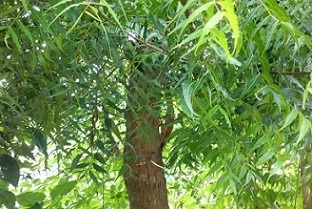American And Indian Scientists Explore Phytochemicals Nimbin And Epinimbin From Bark Of Neem Tree As Prophylactics And Antivirals Against SARS-CoV-2 Variants
Source: COVID-19 Herbs Mar 01, 2022 3 years, 1 month, 3 weeks, 4 days, 11 hours, 2 minutes ago
COVID-19 Herbs: A new research led by scientists from the University of Colorado School of Medicine-USA and the Indian Institute of Science Education and Research Kolkata-India has found that the phytochemical compounds extracted from the bark of the neem tree (Azadirachta indica), namely the triterpenoids Nimbin And Epinimbin and its various isomers are able to inhibit the SARS-CoV-2 virus and its various variants.

The
COVID-19 Herbs study was also supported by researchers from the Karolinska Institute-Sweden, University of Florida College of Medicine, the Translational Health Science & Technology Institute Faridabad-India, Emory University School of Medicine-USA, University of Pennsylvania and the Indian Institute of Science Bangalore-India.
The various emerging variants of the SARS-CoV-2 virus, spotting many unique mutations pose a challenge for vaccine development and antiviral therapy.
In this study, the antiviral efficacy of Azadirachta indica bark extract (NBE) was assessed against SARS-CoV-2 and m-CoV-RSA59 infection.
The inhibitory effects of in vivo intranasal or oral Azadirachta indica bark extract (NBE) administration on viral load, inflammatory response, and histopathological changes were assessed in m-CoV-RSA59-infection.
The study findings showed that NBE administered inhibits SARS-CoV-2 and m-CoV-RSA59 infection and replication in vitro, reducing Envelope and Nucleocapsid gene expression.
Furthermore, it was found that NBE ameliorates neuroinflammation and hepatitis in vivo by restricting viral replication and spread. Isolated fractions of NBE enriched with Nimbin isomers shows potent inhibition of m-CoV-RSA59 infection in vitro.
Detailed silico studies revealed that NBE could target Spike and RdRp of m-CoV and SARS-CoV-2 with high affinity. NBE has a triterpenoids origin that may allow them to competitively target panoply of viral proteins to inhibit mouse and different strains of human coronavirus infections, suggesting its potential as an antiviral against pan-β-Coronaviruses.
The study findings were published in the peer reviewed journal: Virology (Science Direct by Elsevier)
https://www.sciencedirect.com/science/article/pii/S0042682222000022
The study findings importantly demonstrate that phytochemical components of neem bark namely the triterpenoids Nimbin And Epinimbin may target a wide range of viral proteins, suggesting its potential as an antiviral agent against emerging variants of coronaviruses (including SARS-CoV-2).
The Azadirachta indica or neem tree, indigenous to India and also parts of South-east Asia including Northern Thailand, has been used for thousands of years for its anti-parasitic, anti-bacterial and antiviral properties. The bark extract has helped treat malaria, stomach and intestinal ulcers, skin diseases and many other diseases.
The triterpenoids Nimbin And Epinimbin from neem are also anti-fusogenic.
https://www.frontiersin.org/articles/10.3
389/fncel.2020.00116/full
Past studies have already shown that Azadirachta indica bark extract restricts HSV-1 and murine-β-Coronavirus replication, spread, and fusion in vitro.
https://onlinelibrary.wiley.com/doi/abs/10.1002/ptr.3085
https://www.frontiersin.org/articles/10.3389/fncel.2020.00116/full
Study co-author Dr Maria Nagel, MD, research professor in the department of neurology and ophthalmology at the University of Colorado School of Medicine on the CU Anschutz Medical Campus told Thailand
Medical News, "The goal of this research is to develop a neem-based medication that can reduce the risk of serious illness when someone is infected with coronaviruses."
Dr Nagel added, "We hope that scientists won't have to continuously develop new therapies every time a new SARS-CoV-2 variant emerges. Just like how we take penicillin for strep throat, we envision taking the neem-based drug for COVID, allowing us to resume our normal lives without fear of hospitalization and death."
The study team investigated the impact of the bark extract against coronaviruses in their laboratories.
The study team tested NBE in animal models in India and showed that it had antiviral properties against coronavirus.
Utilizing computer modeling, the study team next predicted that neem bark extract will bind to the SARS-CoV-2 spike protein at various locations, preventing virus entry to host cells.
Over at University of Colorado, Dr Nagel's lab tested the neem bark extract in SARS-CoV-2 human lung cells. It proved as effective as a preventive drug for infection and also decreased virus replication and spread after infection.
Dr Nagel further added, "The next step in our research is to identify the specific components in neem bark extract that are antiviral. Because these components bind to various regions of SARS-CoV-2, we believe that it will be effective on emerging variants with spike mutations. We will then determine the formulation of dosage for an antiviral drug to treat coronavirus infections."
The study team said this research could guide new antiviral therapeutic efforts to combat the ongoing pandemic, while holding out the promise for treating new coronavirus strains.
The key points of the study are:
-phytochemical extracts from the bark of the neem tree (Azadirachta indica), significantly restricts newly emerged human β-Coronavirus SARS-CoV-2 infection and replication in vitro.
-the phytochemicals Nimbin/Epinimbin significantly inhibits m-CoV-infectivity, cell-to-cell fusion, spread, and replication in vitro like NBE.
-both NBE and isolated Nimbin/Epinimbin isomers significantly reduces coronaviral-induced clinical outcomes, acute and chronic inflammatory pathology.
-the triterpenoids compounds of NBE inhibit SARS-CoV-2, HSV-1 and m-CoV infectivity, suggesting pan-β-anti-coronaviral/pan-antivirals.
Kindly note that the ordinary Neem leave extracts that are commonly found as commercial supplements cannot be used as a prophylactic or antiviral for SARS-CoV-2 as the key phytochemicals Nimbin/Epinimbin are predominantly found in the bark and not the leaves.
Please help support this website by making a generous donation not only for the sustainability of the website but also for all our research and community initiatives. We are not funded by any entities and are from a corrupted third world stupid country. Your help not only saves lives directly but also indirectly. https://www.thailandmedical.news/p/sponsorship
For the latest on
COVID-19 Herbs, keep on logging to Thailand Medical News.
Also check out our prophylactic and therapeutic teas and our new long COVID-19 teas.
https://www.thailandmedical.news/news/long-covid-19-therapeutic-teas-are-finally-here
https://www.thailandmedical.news/news/new-therapeutic-teas-
